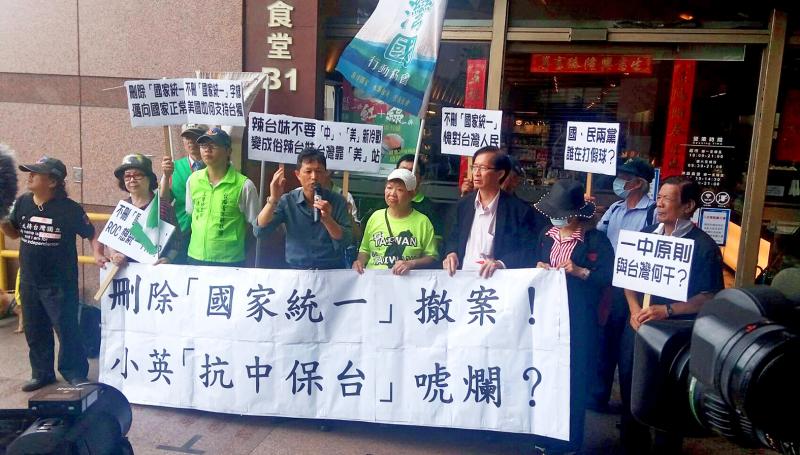Independence advocates yesterday held two demonstrations in Taipei to demand that the Democratic Progressive Party (DPP) and President Tsai Ing-wen (蔡英文) follow the wishes of those who voted them into office by removing the “China unification” clause from the Constitution, while another group urged the DPP to appoint a new chairperson and secretary-general.
Taiwan Republic Office director Chilly Chen (陳峻涵) led members of his organization and other pro-independence groups to protest what they perceive as Tsai ignoring the wishes of the majority of the electorate by continuing to adhere to the Republic of China Constitution and not moving toward building a new nation of Taiwan.
“It is time to remove ‘China unification’ and other related clauses in the Constitution and the Act Governing Relations Between the People of the Taiwan Area and the Mainland Area (臺灣地區與大陸地區人民關係條例),” Chen said at the demonstration in front of the DPP headquarters.

Photo: Jason Pan, Taipei Times
DPP Legislator Tsai Yi-yu (蔡易餘) had proposed a bill to remove the “China unification” clause from the Constitution, but then retracted the proposal last week after being advised to do so by DPP caucus whip Ker Chien-ming (柯建銘).
That move was criticized by the independence advocates.
“In Taiwan, we have our national sovereignty and our government, through free elections by the people. We have no relationship with China and are not ruled by Beijing. So why has the DPP acted with such weakness on the bill? Does Tsai and this government still wish to pursue eventual unification with China?” Chen said.
Taiwanese have supported the DPP as the party that protects Taiwan’s sovereignty, and it has promised to push for Taiwan to become a normal country recognized by the international community, but the party always renege on those promises after elections, he added.
The Taiwan Republic Office demanded that DPP legislators advance their cause by introducing a bill to remove the clause from the Constitution and thereby completely severe any links to China.
It asked the DPP not to fear pressure from the Chinese Nationalist Party (KMT) and Beijing.
Most pro-independence groups support drafting a new constitution to establish a new government framework based on political reality and not on the illusion of the KMT’s ROC, Chen said.
Only then could it move closer to the goal of an independent Taiwan, he said.
A second demonstration by Winston Chi’s (紀文清) Happy National Connection in Taiwan demanded that the DPP start the search for suitable candidates for party chairperson and secretary-general.
Tsai has taken over as DPP chairperson from Cho Jung-tai (卓榮泰), and appointed former deputy premier Lin Hsi-yao (林錫耀) as party secretary-general.
“There should be a division of authority and separation of power. Tsai is the nation’s president, she will be busy working on governance and important policies, such as foreign affairs and protecting the nation’s sovereignty,” Chi said. “She should not take on the double role, as it will concentrate too much power in the hands of one person. It is also important that the authority wielded by the president should not be held by the chairperson of a major political party. The internal affairs of a political party should be separated from the governing of the nation.”
Many grassroots DPP members have issues with Lin being the party’s secretary-general, and they want the party to identify suitable candidates to take over as chairperson and secretary-general, Chi said.

An essay competition jointly organized by a local writing society and a publisher affiliated with the Chinese Communist Party (CCP) might have contravened the Act Governing Relations Between the People of the Taiwan Area and the Mainland Area (臺灣地區與大陸地區人民關係條例), the Mainland Affairs Council (MAC) said on Thursday. “In this case, the partner organization is clearly an agency under the CCP’s Fujian Provincial Committee,” MAC Deputy Minister and spokesperson Liang Wen-chieh (梁文傑) said at a news briefing in Taipei. “It also involves bringing Taiwanese students to China with all-expenses-paid arrangements to attend award ceremonies and camps,” Liang said. Those two “characteristics” are typically sufficient

A magnitude 5.9 earthquake that struck about 33km off the coast of Hualien City was the "main shock" in a series of quakes in the area, with aftershocks expected over the next three days, the Central Weather Administration (CWA) said yesterday. Prior to the magnitude 5.9 quake shaking most of Taiwan at 6:53pm yesterday, six other earthquakes stronger than a magnitude of 4, starting with a magnitude 5.5 quake at 6:09pm, occurred in the area. CWA Seismological Center Director Wu Chien-fu (吳健富) confirmed that the quakes were all part of the same series and that the magnitude 5.5 temblor was

The brilliant blue waters, thick foliage and bucolic atmosphere on this seemingly idyllic archipelago deep in the Pacific Ocean belie the key role it now plays in a titanic geopolitical struggle. Palau is again on the front line as China, and the US and its allies prepare their forces in an intensifying contest for control over the Asia-Pacific region. The democratic nation of just 17,000 people hosts US-controlled airstrips and soon-to-be-completed radar installations that the US military describes as “critical” to monitoring vast swathes of water and airspace. It is also a key piece of the second island chain, a string of

The Central Weather Administration has issued a heat alert for southeastern Taiwan, warning of temperatures as high as 36°C today, while alerting some coastal areas of strong winds later in the day. Kaohsiung’s Neimen District (內門) and Pingtung County’s Neipu Township (內埔) are under an orange heat alert, which warns of temperatures as high as 36°C for three consecutive days, the CWA said, citing southwest winds. The heat would also extend to Tainan’s Nansi (楠西) and Yujing (玉井) districts, as well as Pingtung’s Gaoshu (高樹), Yanpu (鹽埔) and Majia (瑪家) townships, it said, forecasting highs of up to 36°C in those areas